Spain is full of ghost towns that sell for a few hundred thousand euros. There are also such small towns in which, unfortunately, silence is their most precious asset. And I say “unfortunately” because they are isolated areas, towns with barely a hundred inhabitants that are seeking to have a new life and that are launching initiatives to, if not maintain, stop losing population. The idea of a town in Salamanca is to “give” the bar to whoever wants it. They only have one condition:
Open on weekends.
Rent for one euro a year. Coca de Alba is a small town in Salamanca that had its population peak in the 60s with… 273 inhabitants. Since then, free fall to 95 registered in 2024. It is another of those towns with centuries of history behind it, and another of those that have a shortage of resources due to the gradual abandonment of a population that has been migrating to the cities.
To try to breathe life into the town, the City Council has had an idea: rent the municipal bar for a symbolic Price: one euro a year. A few years ago, and after renovating it thanks to the help of the Salamanca Provincial Council, an Argentine family registered in the town and took over the business. He gave it life, but after returning to his country, the premises, fully equipped and measuring 200 square meters, were abandoned again.
“The bar is everything”. Dori Vicente Ciudad is the mayor of Coca de Alba and points out the importance of the place as it is not only… well, a bar, but also a center for leisure, meetings, coexistence and entertainment as it can be used as a civic center. The rent, as we say, is symbolic, but the condition is that “it must open, at least, on weekends.” In addition, the mayor comments that she asks the successful bidders to register in the town and attract people to energize it.
Because the bar will not be the leisure center of Coca de Alba: it will also be the center of people from other nearby towns who could be attracted to the activities held there. A carte blanche, in short. That importance for the figure of the bar is something that anyone who lives in or visits such small towns knows well. Pedro Astudillo is the mayor of Zorita de la Frontera, another Salamancan town of about 150 inhabitants that also rents the bar for about 180 euros per month and is thinking of installing solar panels to alleviate expenses.
“The bar is everything, the meeting place where we all get together, it is a social good,” says the mayor, who shares an opinion with Juan Carlos Martín, mayor of Cantaracillo -190 inhabitants after reaching 825 in the 50s-. “The bar is a meeting point, you see more people on the street, it creates activity, it is a very important benefit and is essential in the municipalities,” says Juan Carlos. Cantaracillo rents his bar for 50 euros a month, and it already has license plates.

Alba Coca
Institutional support. This giving life to the bars of emptied Spain is not an isolated measure and, in fact, the Salamanca Provincial Council itself detailed at the end of 2023 that there was a plan to allocate some 300,000 euros so that towns that do not have active hospitality establishments can open one. Thus, each city council that requested it would have up to 30,000 euros to undertake the renovation.
At the time, it was estimated that there were at least 80 towns that could benefit from the subsidies and it was ensured that anyone who met the requirements would not be left without help. The conditions were similar to those of Coca de Alba: commitment to opening throughout the year with an activity of at least two days a week.
It is not an isolated case. It is no longer just the symbolic price (and not so symbolic in other cases), but the commitment of the towns by installing solar panels or covering the expenses of the bar so that the meager profits that the establishment gives go to whoever settles in the town to run it.
Although we mention cases of Salamanca, other towns have recently launched contests to find someone to run the municipal bar. Bermellar is also in Salamanca and, apart from offering the bar for one euro, it also includes housing. Towns in Burgos such as Santa Cecilia have similar offers and, apart from institutional initiatives, there are also some private ones.
For example, BarLab Rural is a project promoted by Mahou-San Miguel and AlmaNatura to reopen bars in towns with less than 5,000 inhabitants. There is no clear guide to attract population or, as we said, encourage what is there not to be lost. And there are plenty of examples of initiatives, such as promoting research, creating parties, getting everything done or, directly, paying for you to move.
Images | Google Maps, Tamorlan
In WorldOfSoftware | Spain’s industry is moving from traditional cities to Emptied Spain. The reason: renewables
